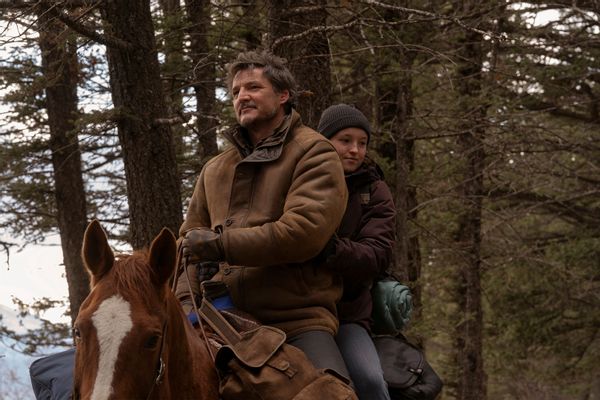
As a horror fan, I've seen my share of zombies. Some are fast, some are slow. Some infect via blood or bites. Some zombie viruses can be transmitted to dogs, even bears. Devoted to the genre, I'm always excited by a different take. The swarming zombies of "World War Z" for example, and how they worked together to form zombie ladders. Or the mushroom zombies of HBO's popular "The Last of Us." That's different, right? Fungus blooming out of the brains of the infected like one of Padmé Amidala's hairdos.
But here's where "The Last of Us" breaks away from the likes of "28 Days Later" or "Dawn of the Dead" (the original or the remake): HBO's monsters aren't scary. Or maybe it's us who have changed.
I felt the same way watching "Knock at the Cabin," M. Night Shyamalan's latest film. Billed as horror, it feels more like a newsreel, as four armed strangers break into the cabin of a vacationing couple and their young child and say they are there to prevent the apocalypse, signaled by catastrophic events as familiar to us as they are terrible, including illness.
Three years on, though the pandemic still rages, many people have pandemic fatigue. We have apocalypse fatigue too. We've been there, seen that, are living through it, and we no longer turn to these stories for scares but for something else: hollow comfort and cold recognition.
In "Knock at the Cabin," the four intruders, led by the always-wonderful Dave Bautista as Leonard, storm into the isolated rental cabin of Eric (Jonathan Groff ), Andrew (Ben Aldridge) and their young daughter Wen (Kristen Cui). Leonard and the others (Rupert Grint as Redmond, Nikki Amuka-Bird as Sabrina and Abby Quinn as Adriane) say they are there because they have been called to demand a sacrifice from the family, seemingly chosen at random. Eric, Andrew or little Wen (though her life never really seems in danger) must offer themselves as that sacrifice in a set amount of time, or the world ends. So-called proof of the strangers' claims? A series of disasters, which the group witnesses on TV. (Luckily the cabin has cable!)
But the unfolding events of the apocalypse? They just aren't frightening enough. A tsunami? We know that. A plague? Been there. In a review on Roger Ebert, Nick Allen writes, "M. Night Shyamalan should probably just stay away from the apocalypse . . . the threat of violence in this immediate scenario is specifically numbed," and adds, "'Knock at the Cabin' creates one anticlimax after another."
Clickers don't look frightening. They look, frankly, adorable, like a savory Stay Puft Marshmallow man.
The tension isn't there. Neither is the terror. In its place, is a stale déjà vu feeling. "Did I just do a commercial?" Daddy Warbucks famously says in "Annie." Did I just watch a documentary? I thought at the end of "Knock at the Cabin."
The true monsters are often humans but that isn't exactly the case in "Knock at the Cabin" either, where the strangers are doing their best, even if their best is very misguided, possibly delusional. One of the dads is the only skeptic here, and it's hard not to side with him. I mean, earthquake? Is that the best you've got? We've got snow in Southern California now. We've got Ohio suffering possibly the worst environmental disaster in history. We had a quake devastating Turkey-Syria just days ago. It wasn't the first and it unfortunately won't be the last disaster.

We turn to fiction for different reasons, for escape (and that includes the horror type of escape), but also for recognition.
Multiple viewers, including a writer at Vulture, have raised the question: Why don't "The Last of Us" heroes just eat the mushroom monsters? Squirt some butter on them and knock them into a campfire, sprinkling on some wild onion or thyme? Even the clickers – massive creatures, more mushroom than human – don't look frightening. They look, frankly, adorable, like a savory Stay Puft Marshmallow man (and you could eat him).
What keeps viewers watching if not for the thrills and scares promised? This was put to the test in the last episode, where we finally see how Ellie (Bella Ramsey) receives the bite that defines her. But because we know she's not going to die, she's not going to turn; she's immune, it feels weirdly low-stakes. The threat of death is everywhere in the show but as it's not a real threat for the main character, it's not real for us either, not as real as the threats outside our own door.
We turn to fiction for different reasons, for escape (and that includes the horror type of escape), but also for recognition. We want to picture ourselves in stories, and right now, we're living in a world just as wild in many ways as the likes of "Knock at the Cabin'' or "The Last of Us." Just as apocalyptic, just as sometimes hopeless-feeling. No, we don't have monsters biting us (yet), but we have a virus that sickens, disables or kills many while leaving others – like Ellie – untouched. And we have a world just as ravaged as the one in the film. More so, because an individual sacrifice won't make a dent.
But just because they're not scary stories doesn't mean we don't want them. We just want something different from them now. We see ourselves and our current lives in them, and maybe that's why we keep watching. Not to be sacred, to be seen.







